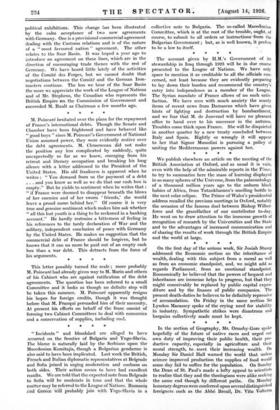M. Poincare hesitated over the plans for the repayment of
France's international debts. Though the Senate and Chamber have been frightened and have behaved like " good boys " since M. Poincare's Government of National Union assumed power, they were evidently restive over the debt agreements. M. Clemenceau did not make the position any less complicated by suddenly, quite unexpectedly so far as we know, emerging from his retreat and literary occupation and breaking his long silence with a letter addressed to the President of the United States. His old frankness is apparent when he writes : " You demand from us the payment of a debt . . . and you know as well as we do that our cash box is empty." But he yields to sentiment when he writes that : " if France were doomed to disappear beneath the blows of her enemies and of her sworn ` friends,' she would leave a proud name behind her."- Of course it is very true and genuine sentiment which makes him ask whether " all this lost youth is a thing to be reckoned in a banking account." He hardly restrains a bitterness of feeling in his references to the tardy declaration of War and the solitary, independent conclusion of peace with Germany by the United States. He makes no suggestion that the commercial debt of France should be forgiven, but he knows that it can no more be paid out of an empty cash box than a war debt. This detracts from the force of his arguments. * *


































 Previous page
Previous page